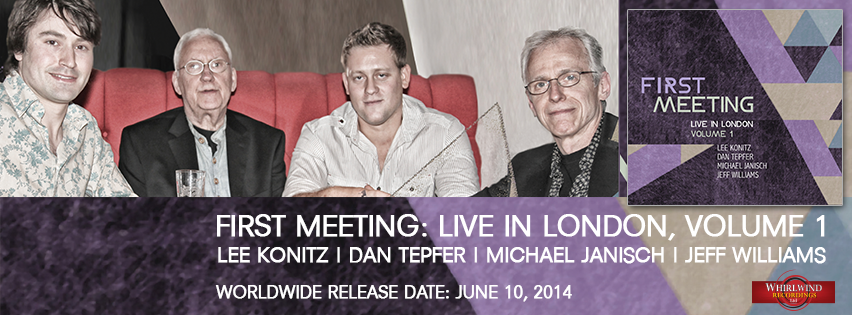10th June 2014: RELEASE DAY: First Meeting: Live in London, Volume 1, Lee Konitz, Dan Tepfer, Michael Janisch & Jeff Williams launches worldwide today + 4 Star Guardian Review
It gives us great pleasure to announce the worldwide release today for First Meeting featuring the iconic Lee Kontiz, Dan Tepfer, Michael Janisch and Jeff Williams. Recorded live in London at the Pizza Express Jazz Club in May 2010 and produced by Janisch, the album has already been getting a lot of praise in the international press and we’ve just had a 4 Star Guardian Review hit that calls the album ‘spellbinding’.
Click here to purchase your copy.
ABOUT THE ALBUM:
Lee Konitz is “one of the most consistently brilliant, adventurous and original improvisers in the jazz tradition” (John Zorn). His recorded legacy is massive and uniquely influential, stretching back to his recordings in the late 1940s with the Claude Thornhill Band, Lennie Tristano and Miles Davis, and his debut as leader in 1949.
This recording, First Meeting: Live in London, Volume 1, made six decades after those first outings, still portrays a great master with the determination and the means to continue to explore and to break new ground. Although the four individual co-leaders of this collaborative album, Konitz, bassist Michael Janisch, pianist Dan Tepfer and drummer Jeff Williams, have a web of cross-connections going back in some cases several decades, this is their first appearance on the same stage as a quartet. Konitz’s recordings in London are rarities; just a handful of dates from the 1970s and 1980s exist along with a recent date with the great bassist Peter Ind. It is also a very rare outing for Lee Konitz on soprano saxophone, which he plays on three tracks here.
Aged 82 at the time this recording was made, Lee Konitz had deepened and pushed further his highly original way of improvising. The repertoire is ostensibly of well known standards, known to the players, but they serve as a jumping-off point for the quartet to head off in any direction. The whole context is one of spontaneity and immediacy. As the First Meeting sleeve-note says. “There was no rehearsal, plan or preconceived idea of the music’s end result.”
The music on this album is extracted from six hours of music recorded over two nights in May, 2010. Under Mr. Konitz’s instruction, anyone could start playing a melody and the rest of the band could join in, or not. As a result, First Meeting features some stellar solo intros alongside duo, trio and of course full quartet performances. This first volume also captures the more concise statements that were recorded, where tunes were started and finished. The quartet also explored some freer and more exploratory paths, and these selections will form a subsequent album.
The sessions were instigated by US-born, London-based Michael Janisch, the bassist who had made his home in the UK in early 2005. Michael got to know Konitz when performing together at the Glasgow Jazz Festival in 2008. That first, successful meeting led to the invitation for these sessions two years later. Janisch had a monthly residency at Pizza Express Jazz Club in Dean Street, London, which ran from Sept 2009 until Nov 2011. In retrospect, Janisch describes these sessions as a pinnacle of that residency. In his own words: “Lee said to us before the show, ‘I dont want to talk a set list through, and make sure you don’t play the way you normally play, just keep those ears open to anything.’ When I listen to the music we recorded I hear a lot of peaks and valleys. At times we are very connected and its really buzzing. Other times we’re checking each other out, sitting back and allowing the music simmer a little, to see what happens, and sometimes I can tell we didn’t even know what was next. And it is in those moments where Lee tends be decisive, to shine. The songs were just vehicles for on the spot improvisation.”
A week before the recording, Konitz gave me an interview looking forward to the sessions, and to playing with these younger musicians. He was in a benign mood: “I don’t wear my heart on my sleeve. But emotion is the main point. What it’s all for is to make an emotional contact. When I’m playing, when I ‘m listening to myself, that’s always what I’m listening out for, and hearing. The more notes you play, the less attention you can pay to each one. So I tend to put more faith in single notes. Held notes. I’m lucky I can still play. I’m enjoying it more than ever.”
– Sebastian Scotney (Editor of London Jazz), Feb. 2014




